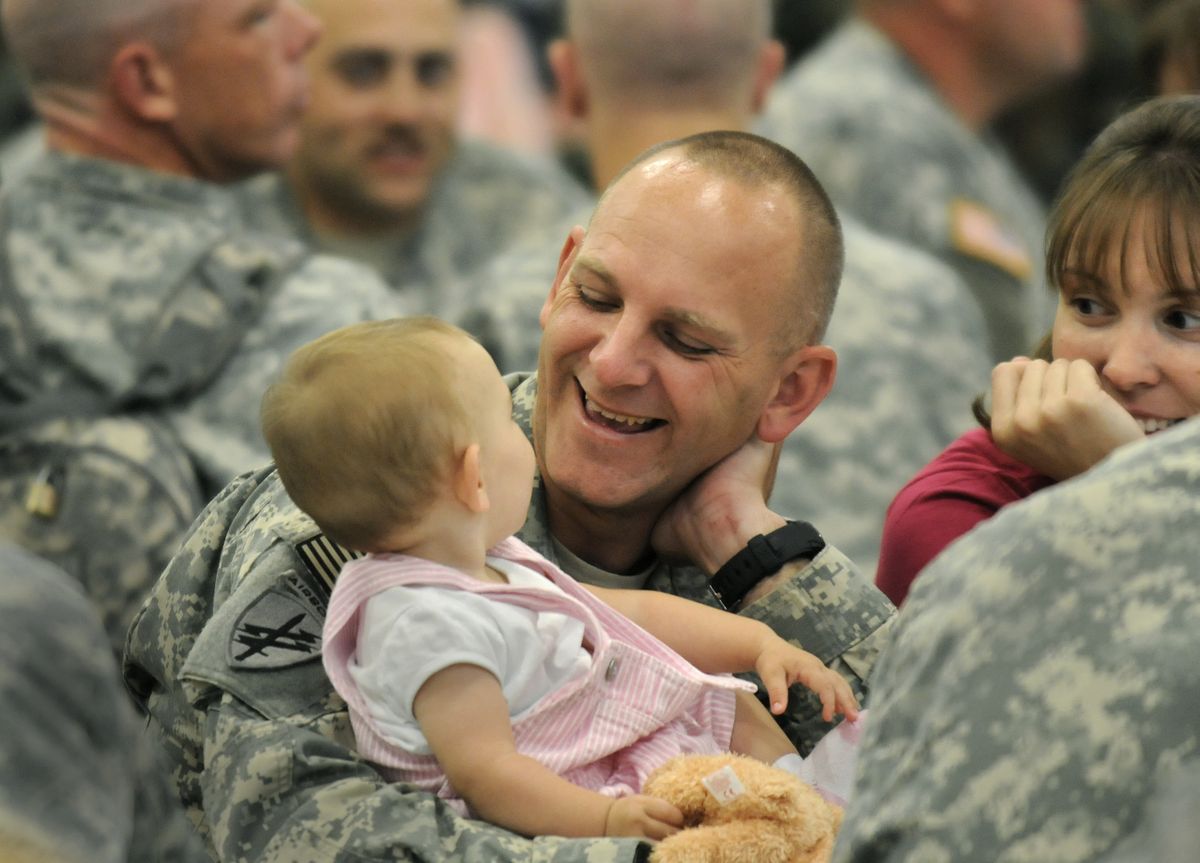Soldiers say goodbye, again
As combat team leaves for second tour in Iraq, those left behind face familiar sacrifice

Sgt. Travis Fletcher’s thoughts Tuesday were less about being sent to one of the world’s most dangerous places and more about his wife, his daughter and how much he loves them.
Ceremonies in Spokane and 13 other cities across Washington honored Fletcher and the other men and women of the National Guard’s 81st Brigade Combat Team as it prepares for its second deployment to Iraq.
Fletcher’s wife, Halli, and their 5-month-old daughter, Olivia, couldn’t be at the Washington Army National Guard Readiness Center on Tuesday, but everybody gathered at the farewell ceremony and barbecue understood the sacrifice families like his are asked to make.
“You don’t make this sacrifice alone,” U.S. Sen. Patty Murray told the Guard members, nearly 300 of whom are shipping out Tuesday and today to join about 3,400 brigade members for training in Wisconsin before heading to the Middle East.
Murray was joined on the stage and in her sentiments by U.S. Sen. Maria Cantwell, Rep. Cathy McMorris Rodgers, Spokane City Council President Joe Shogan and Maj. Gen. Timothy Lowenberg, the adjutant general of the Washington National Guard.
None had to tell Fletcher about sacrifice.
This will be the medic’s second tour in Iraq, having served with the brigade during its 2004-’05 deployment. This time he leaves a family, with a second child on the way.
“It’s toughest for the people left behind,” Fletcher said, explaining that soldiers are trained and focused on their mission while in-country. They share with their comrades a common interest in staying alive and getting the job done.
Their families, on the other hand, are left alone, spouses without their partners.
Fletcher, 27, is the lead medic in H Company, 1st Battalion, 161st Infantry. At the end of his last tour, he was assigned to E Company, which trained Iraqis to fight. At the time, he said, Iraqi security forces came under attack more often than the better trained and armed U.S. forces.
He has treated the wounds of U.S. and Iraqi soldiers, as well as those of Iraqi civilians.
The 1999 West Valley High School graduate said he is torn about going. He hates to leave his young family, but he knows his combat experience will be invaluable to the medics under him who will treat combat injuries for the first time.
About 70 percent of brigade members have served at least one tour in Iraq, The Spokesman-Review has reported.
Among those serving their second tours with the 81st is Cpl. John Hahn, 49, of Ford, Wash. He was surrounded at the Readiness Center on Tuesday by no fewer than 13 aunts, uncles, nieces and nephews from the Spokane and Colville tribes.
“Probably the largest family here today,” Hahn boasted.
He hopes his experience in Iraq helps keep his comrades safe.
“I am happy to serve the state of Washington and do what I have to do and pray to get home to my family,” Hahn said.
The brigade’s mission this tour will be more focused than in 2004-’05. Members will escort and protect convoys from Baghdad to points north, according to battalion commander Lt. Col. Greg Allen, of Tacoma.
“It will be a challenge,” Allen said, adding that his soldiers will leave their tanks and Bradley fighting vehicles behind for the less familiar MRAPs and “up-armored” Humvees.
Fletcher said he would prefer to be on foot. Vehicles are the preferred targets of enemy fire and roadside bombs.
The key to survival is to stay alert, the medic said. Distractions can be dangerous.
“As soon as you let your guard down, that’s when bad things happen to the guy next to you,” Fletcher said.
The men and women of the 81st Brigade are expected to be back by this time next year.